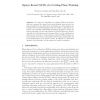Free Online Productivity Tools
i2Speak
i2Symbol
i2OCR
iTex2Img
iWeb2Print
iWeb2Shot
i2Type
iPdf2Split
iPdf2Merge
i2Bopomofo
i2Arabic
i2Style
i2Image
i2PDF
iLatex2Rtf
Sci2ools
124
click to vote
PKDD
2009
Springer
2009
Springer
Sparse Kernel SVMs via Cutting-Plane Training
We explore an algorithm for training SVMs with Kernels that can represent the learned rule using arbitrary basis vectors, not just the support vectors (SVs) from the training set. This results in two benefits. First, the added flexibility makes it possible to find sparser solutions of good quality, substantially speeding-up prediction. Second, the improved sparsity can also make training of Kernel SVMs more efficient, especially for high-dimensional and sparse data (e.g. text classification). This has the potential to make training of Kernel SVMs tractable for large training sets, where conventional methods scale quadratically due to the linear growth of the number of SVs. In addition to a theoretical analysis of the algorithm, we also present an empirical evaluation.
Related Content
| Added | 27 May 2010 |
| Updated | 27 May 2010 |
| Type | Conference |
| Year | 2009 |
| Where | PKDD |
| Authors | Thorsten Joachims, Chun-Nam John Yu |
Comments (0)

